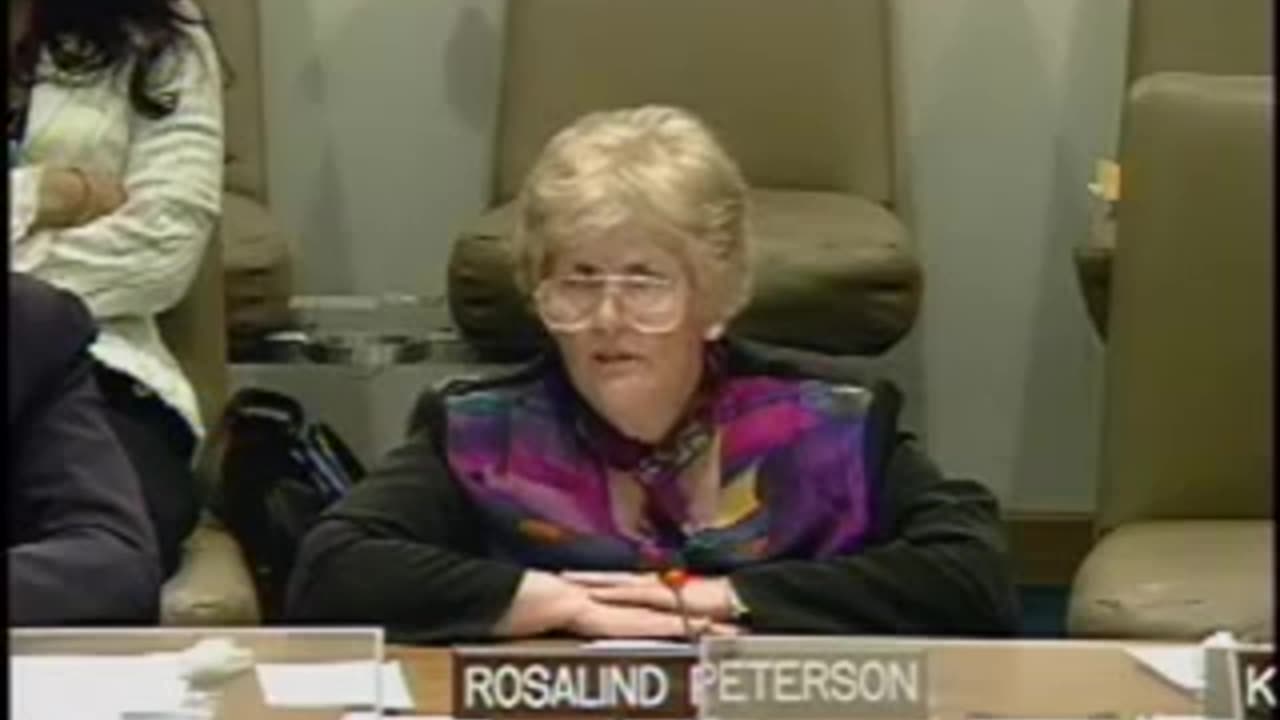Premium Only Content

2007 Rosalind Peterson at UN Climate Change Conference 38 min - Geoengineering / Chemtrails - backup
thank you very much I'm Richard Jordan
chairman of the conference I'm going to
just introduce Khalid
Dawood who will introduce the speakers
madam Lee shaoling vice president of the
Chinese People's Association for
friendship with foreign countries will
be the first presenter she must catch a
plane early this evening so she will
entertain two questions if you write a
couple of questions pass them up to
Khalid who will take two of them and
Madam Lee will answer those in response
to your question so thank you very much
for moderating this session and I turn
it over to you and I will return in
about three minutes okay I'd like to
thank you all for coming here of course
this is a very important topic for
different world countries we're honored
to have such a group of experts with us
here
each probably with a particular
specialization that you're going to
tackle the negative impacts of climate
change particularly when it comes to
important topics such as agriculture
deforestation and many topics that may
be very between different parts of the
world's different regions depending
whether it's a developed country or
under developed country or developing
country like Egypt where I come from but
I think that's a very important topic
for all of us and without any further
delay because our first guest as we have
just heard has a plane to catch so we'll
just move straight to mrs. Lee who has
who's representing Chinese and Jiro
particularly concerned in a country as
big as and important as China on the
affect of how to provide such a
population with the amount of food that
we need then this she will mention her
speech she will talk to us about your
experience in this respect thank you
very much please go ahead Thank You mr.
chairman
ladies and gentlemen friends an occasion
of the 60s un de pie into a new
conference I'm delighted to be invited
as a representative
thank you very much so our next speaker
is dr. Rosalind Peterson she's the
California presidents and co-founder of
the agricultural defence coalition
formed in 2006 soon she's the California
president and co-founder of the
agriculture defense coalition formed in
too-perfect agricultural production from
uncontrolled experimental weather
modification programs a very interesting
topic you know for an unspecialized
person like myself but also very
interesting in her CV that we have with
you is also extensive efforts to protect
drinking water supplies from toxic
chemical contamination and Martinez
California that's a very interesting
topic of course and I was actually
wondering myself whether you can tackle
whether the same experiments that you're
holding in California could be extended
to other world countries particularly
poor in developed countries like where
we come from thank you good afternoon
ladies and gentlemen mr. chairman
it is a pleasure to be here to speak
with all of you today one of the things
that I would like to say is that we are
in a global drumbeat right at the moment
talking about climate change and global
warming one of the things that is
affected by climate change is
agriculture but some of what we are
seeing is man-made but man-made in a
different way than you may guess weather
modification programs experimental ones
done by private companies done by the
United States government done by states
across the United States are underway
there's more than 50 of them in
operation across the United States all
of these impact agriculture because they
change the microclimates needed for
agriculture to survive
none of these programs that I know of
today and this is all public record are
available at any time with oversight
agricultural oversight or public
oversight these programs impact
agriculture and there are programs
around the world international
corporations are modifying our weather
all the time and they're modifying it in
ways that cover thousands and thousands
of square miles most of it is chemically
altered so that what happens is that we
are putting chemicals ground-based
chemicals that are shot into the air or
chemicals coming from airplanes that
change and modify our weather so one of
the things that I'm concerned about and
that we need to address in the future is
how these programs are impacting micro
climates needed for our crops to survive
and needed for pollination if we change
the growing season the pollinators may
not survive and also our crops our
flowers and our tree crops may not get
the pollination needed so one of my
areas is looking at this situation to
see if we can begin to put under control
experimental and other types of weather
modification programs the other issue is
that a lot of times we're talking about
mitigation for climate change it's
rather an undefined term at this period
of time and so what happens is that many
times we're talking about artificially
putting chemicals like sulfur or
particulates into the atmosphere and
what they call geoengineering schemes to
reduce and and help
planet supposedly but help the planet to
not go through such a tremendous global
climate change and to mitigate global
warming however the incidence of putting
chemicals into our atmosphere is going
to change and impact agricultural crop
production and if you take and you put
up into our skies chemicals to reduce
the amount of sunlight reaching the
earth you are going to begin to reduce
crop production studies at the
University of Illinois on corn crop
production show reductions without the
process of photosynthesis whereby plants
from direct sunlight gain the energy to
grow to produce crops we are going to
find ourselves if we mitigate in that
direction impacting the crop production
not only here in the United States but
worldwide one of the things that is
impacting crop production right now in
the United States and reducing
photosynthesis and also impacting the
ability of solar power panels to
generate the type of power that they
should is persistent jet contrails NASA
talks about persistent jet contrails as
exacerbating global warming because they
trap warmth in the atmosphere when they
produce Cirrus and man-made clouds NASA
also talks about that when we get these
aircraft leading persistent contrails
are changing our climate and when they
change our climate to the degree that
one jet can leave a persistent yet
contro which will spread across our
skies from what this picture up here on
my left and the screen looks like which
is a trail left by a jet that trail can
expand to four thousand kilometres and
lasts for 20 hours this was unheard of
in the early 60s and the 70s and it
wasn't until the late 1980s that there
was a change and we started to have
persistent jet contrails that persist
nasa studies show that part of our
global warming problem could be
attributed to these types of contrails
and the jets that leave them so one of
the issues as we go through is how do
you like your skies natural or man-made
and right now we are making man-made
clouds and this is trapping warmth in
our atmosphere the climate change that
is produced by these Jets not all Jets
mostly some non-commercial but what
happens to our skies is that we start to
see the changes the man-made clouds do
trap the warmth and they increase the
humidity this allows for pests to
proliferate diseases molds mildews
funguses and viruses this is a man-made
cloud ladies and gentlemen and these
pictures I took myself over Northern
California and this is a burst this is
where jet left a hot huge plume and then
this turned in at the end of it to
immerse and this is not normal never
seen before in our County historically
and I was born and raised there this is
another picture showing the jet trail
just before the burst this is our skies
and I want you to know that what you're
seeing now a lot of times many
scientists know especially at NASA and
in other areas that the skies that we're
seeing are not normal cloud formations
these are man-made and what happens as
we reduce the amount of sunlight in a
form of global dimming we reduce the
solar power with these type of clouds
and we reduce photosynthesis which is
going to impact agriculture the pictures
look odd the formations don't look like
normal clouds that people have seen
before historically this is another type
of man-made cloud and what we have done
and what you're seeing here is we have
the photographs from the time
that the jet leaves the first trail as a
thin spindly trail to where they form
into these different types of cloud
formations all of you can start looking
up and seeing this what happens is that
there are experiments and there's a
color you can see some color in this
photograph and part of what we're doing
also is we're sending up canisters the
United States government NASA the US Air
Force is sending up canisters into the
atmosphere filled with chemicals to
modify and experiment with our or our
ionosphere and when we modify and
experiment with our ionosphere up here
we create experiments which they can see
for it through these persistent jet
contrails as they stay in the sky for
long periods of time and they can watch
the experiments the type of chemicals
they are using are aluminum barium
strontium and these canisters are sent
up on rockets and what they do is they
superheat the canisters to create
experiments in our atmosphere the
experiments can give you colorful
Aurora's which they talk about as being
wonderful many times people think that
the air war is in in Alaska and and the
ones we see are normal but those
beginning to be more and more seen
across the United States and elsewhere
where aluminum try methyl aluminum
experiments to make clouds are beginning
to impact us the reason I am concerned
for agriculture is that none of these
experiments have any public oversight
nor agricultural oversight our drinking
water is impacted because the chemicals
are now beginning to show up in our
drinking water in California the State
Department of Health drinking water
tests will examine between 1970 and this
year and we found unusual spiking in
barium aluminum strontium magnesium
calcium manganese and all of these
spikes at the same time in various
drinking water supplies across the state
of California and also in Arras
so what's happening with these
atmospheric tests is that aluminum as
one example gets into with increased
pollution and acid rain gets into the
root systems of our crop trees and our
trees and it looks like the trees are
dying of drought but they're not what
happens is that the root systems can no
longer absorb the water and the
nutrients needed to survive many of our
forests and ready in California and
other areas are dying the oak trees the
redwood trees the Douglas fir across the
United States many areas we believe that
these trees are impacted because they
cannot absorb enough water because
aluminum is going into their root
systems also molds mildew and fungus
some warmer temperatures produced by
persistent jet contrails are also
allowing pests and molds to proliferate
also impacting tree health and crop
health the skies that you see up here it
is important to note have a white haze
to them when crossing the United States
two days ago we saw this man-made
produced haze all the way across the
United States there were few real clouds
we saw the persistent jet contrails from
the jet windows and the skies and the
white haze looked a lot like this
so one of the things that we need to
really look at is that jet fuel
emissions contaminate our air much as
automobile exhaust they know from
scientific studies back in the study and
in the 1970s that they deplete
beneficial ozone in the atmosphere by
releasing nitric acid so one of the
things that we need to look at is the
impact of just jet fuel and just the
emissions from jets as well I want to go
on and talk briefly about a couple of
issues here that I think are important
for everyone to realize
if we don't look at the problems that we
are creating the atmospheric testing
programs the jet in other words the jet
contrails that are warming our climate
and we say to ourselves we want to
Geoengineer something else we want to
add more particulates to help global
warming or to stop climate change what
we're going to have is we're going to
have a pea soup up there of chemicals
which are going to be detrimental to our
health it is much better to take the EPA
model of the 1970s where the
Environmental Protection Agency was
designed to put in regulations to reduce
the pollution at its source to reduce
and put caps on how much pollution
corporations cars automobiles were
putting into the atmosphere one of the
things that we're talking about is
mitigation is to go into geoengineering
plans which add more chemicals to our
atmosphere which are going to get into
our drinking water supplies which are
going to get into our soils which are
going to impact our trees our trees
across the United States many of them in
many areas especially Mendocino lake in
Sonoma County are dying they are not
healthy as they used to be and this
problem having traveled across the
United States into some other areas
seeing the pictures coming in from
across the United States and it support
me and other countries we're finding
that there is beginning to be an impact
from all of these programs and all the
chemicals in our skies and so one of the
things we need to think about and work
for is reducing pollution Allen duck
from Buckman from the California State
Department and Fish and Game talked
about microbes and they're important to
the environment we have at our disposal
already some technologies and already
the wherewithal to begin to make the
planet more healthy and to put it into a
different perspective
but if we go to the geoengineering
schemes that are waiting in the wings
thousands of them to put the
particulates up and suffer then we are
going to be in trouble with agriculture
across the United States and around the
world it is time that we look at some
different solutions that are already
here and it's time that we look at
what's happening in our skies and say we
don't need to add any more chemicals we
are doing enough and what these
experiments and our skies are doing
without the spirit heating and testing
we don't know but the chemicals are
showing up in our drinking water so in
closing I would like to say to all of
you and to encourage you to know that
just what I showed you today is
beginning to impact crop production in
the United States and we're seeing
higher UV radiation that is burning the
tips of our trees and our plants we see
the molds and mildews growing here and
we see all of this and we hope that all
of you will consider before you think of
mitigation and just go forward with some
of the plans that are that are being
sold to you as almost a cap-and-trade
situation where a corporation like
blanka's decides to put iron dust into
the Galapagos Islands area this is a
proposal may have already started and to
create algae blooms and yes they're
saying yes we're going to help the
environment because we're going to
create these algae blooms with for more
oxygen but what happens is it's going to
impact the marine life in those areas as
a geoengineering plan it is going to be
sold the credits for this that the the
supposed benefits is to be sold to yes
okay I'd like to move on
synchros there's a lot of questions
maybe we can just one small favor I mean
the handwriting it's like I'm having
some difficulty I mean I know it's an
intellectual matter but please help me
that's actually to start it's a question
that came up to my mind when dr.
Peterson was speaking about the effects
of the jet rails and all these matters
we had a question from Helen Mary
doesn't really say where it comes from
but essentially the negative
consequences of climate or the climate
warming so evident how does all the
atmospheric pollution from warfare
contribute resolution just happened to
me when you're speaking about California
and effect of the jet flying over
California again what about the effects
of the jets flying over Iraq every day
I'm sure they're doing a lot of sorties
there you know and I was wondering
whether the pollution in Iraq is just
one major side problem to the major of
human disaster that we're saying places
there but basically don't you think that
welfare is also affecting our climate
change and warming issues besides the
direct effect that you can see in
western rich countries like the United
States thank you
I do believe that the planes the jets
that fly everywhere not only over Iraq
but in all countries are contributing to
climate change and contributing to the
air pollution that we have that impacts
crops and agriculture and it is a
serious problem a while ago I had a
slide up there to show some of the
impacts of jet fuel emissions and the
Jets that are flown worldwide with
different formulations are impacting us
greatly around the world and many of
these slides that you saw in the
pictures the pollution and those
persistent contrails are in many many
countries around the world thank you
very much another interesting question
that's coming in and probably I'd like
to leave it up to you maybe whoever
wants to answer this question concerning
the coast of Technology do you think
technology can play a serious role in
solution towards global warming or will
the need be tank now responsibility be
the most redeeming and effective actions
if so is there more we can do at the
same time to double the effectiveness
like creating more jobs or you know
she's like that so it's basically
technology it's a very expensive matter
and I wondering with all your stickies
here you can answer me about this
question whether it's the only viable
solution to to treat this serious
problem that we have to set in climate
change we have a lot of technologies but
also we have a lot of things that have
already been invented that we can use so
some of the technologies are here today
microbes are here today which can be
used to help our planet to clean
pollution to do a lot of things for us
and so what we have to do is we have to
know that there is some technology that
already exists the other issue is that
we cannot out of here trade one
technology for another because the
solution of the one technology may not
be as beneficial as we may believe for
example in California that there's
bill right now to ban incandescent
lightbulbs and yet we may be trading one
pollution problem for another because so
listen light bulbs contain mercury and
one of the things is if you break of our
key revolve in your house your house or
the Romans in becomes a toxic site
hazmat site you can't use your vacuum
cleaner to vacuum it up because your
vacuum cleaner has to be impounded
because it becomes dangerous to use in
the future one of the things that's
happening in California is pollution
from Mercury and from a lot of mercury
getting into from waste sites and dump
sites getting into water supplies and
impacting the fish so what happens in
this case is are we trading one problem
in other words incandescent bulbs to
save us from one type of pollution and
are we taking on another type of
pollution so one of the things about
technology is that I would say that we
should invent a light bulb that uses
less power that also does not
incorporate mercury which means we have
to have a mercury source for those light
bulbs and we have to dispose of them in
California service and light bulbs have
to be contained in a container that does
not break and has to be taken to a waste
site so we have to think about what
technologies we have invent good ones
but we also have to use the ones we
already have thank you thank you I'd
like actually you know I've already seen
lots of questions so maybe we'd be
enough with what we have right here let
me have a different question for mr.
Carter sorry this question says how do
you and FF prevent illegal logging
happening everywhere including Bubba
Eugenia I think that co2 go back to dr.
Peterson actually your presentation
concerning the and its effects on
California this is a question that makes
a lot of sense so what after what you're
saying the questioner is asking what are
you suggesting for us to do should we
basically fly less is this resolution
and particularly a country like America
were like you know we say you know
airplanes is as you know common as
trains in our parts of the world thank
you I'm not suggesting that we fly less
what I am suggesting is that we can make
our gets less polluting and there is
some efforts in the United Kingdom right
now to make jets less polluting to begin
to clean them up but you have to know
that persistent jet contrails are not
produced solely by commercial airlines
there are many of the many of the jet
contrails that you see are private
planes they are military claims so what
happens here is that we have to we have
a broad-based problem we can fly jet
airplanes without leaving persistent jet
contrails it was done in the 60s and the
70s now we can reformulate the fuel make
the Jets less polluting and there are
things that we can do right now that
would that would begin to take care of
some of the problems and we can we can
work on the problem of nitric acid and
reducing the emissions of nitric acids
so there are formulations there are
things that we can do and we have some
of the best for all these problems we
have some of the best people in the
world that have some of the most
brilliant ideas
and I'm sure that we can find a solution
working together dr. Peterson is very
well hydrated I have to read it lad use
practice studies includes a percent of
the world's population is urban
government and developments government
and developers faced the dilemma of
providing decent housing to at least 1
billion people many of whom are
unemployed how could we link the
provision of urban housing to production
of food by the beneficiaries of the
housing creating jobs for them at the
same time thank you
speak to this because in Sacramento
California
night agricultural land right now is
turning into miles and miles of tract
homes these tract homes they're not
providing public transportation there's
going to be more and more demand for
cars and our beautiful agricultural land
is never going to be available again in
the near future to produce food crops
the situation here is that we have to
build differently we need to build a
little bit higher possibly and we need
to not put in these miles and miles of
track tones which cover agricultural
land this is happening in the Central
Valley this is happening in many areas
so we have to find ways to design
communities which become able to exist
within our agricultural land so that we
can keep most of the land in crop
production and this is a problem that
we're going to face across the United
States and around the world as we need
more food there's going to be more
demand for a land to produce it but also
as we have more people there's going to
be a demand for housing and I think we
have to design housing communities and
in several areas in California they're
designing housing communities which use
little lands and they take land that is
not agricultural land they take land
that is undesirable for agricultural
production to put into usage for housing
so I think that this is something we
have to look to in the future instead of
covering over and paving over we talk
about global warming but paving over our
land for housing tracts and since we
have two university professors in the
panel here I got a rather interesting
question see we had some competing
figures and whether we should plant one
tree or two trees and
the questioners asking whether we should
be should plant one tree or two trees
and you know the question is asking
whether we should be I hope it's not a
mandatory requirement but it should
whether she each student be required to
plant at least eleven trees to qualify
for graduation in high school or
colleges what do you think I think we
all should plant trees I think that
that's very very important but we also
have to discover right now why 83% of
the trees in the Sierra Nevada are dying
we have to look at why the trees the
newly planted trees to replace dead and
dying Douglas fir are also dying so one
of the things that we're looking at
whether it's Connecticut and a plan to
cut down all of the trees in a certain
area of Connecticut without finding out
why they're in deteriorating condition
and why Senator Dianne Feinstein made
the suggestion that we should cut down
trees in the Sierra Nevada without
putting one dime of money in defining
out why we were losing so many of our
precious trees so yes I think everyone
should plant trees but remember it's
planting trees and it's caring for them
and getting them started and also to
find out why we're having such
deteriorating problems at this time so
but yes I think so for graduation
certainly about eleven trees
you're not going to get you there please
elevenses first 11th race is fine just
an additional point
yes let's plant trees but it's also
matters what type of trees we do like in
many areas where you have experienced
die back and what is not dying it is
because these are introduced species
which are not perfectly adapted to that
environment we are also facing the same
phenomenon now because of the climate
change so the best medicine against that
guy back would be to plant and use and
regenerate trees which are very well
adapted to those conditions native
species this is my and then the nature
will take care of that if if these
native species cannot survive nature
will bring up something else robbed or
something else what about the introduced
species is is a mistake in in our
history please go ahead just a bon mot
at the end there's a wonderful book out
right now called the earth without us
might be familiar with that title it's
worth reading and on the cover it shows
a landscape of the city and then on the
bottom on the same icon it shows trees
you even have both of these things I was
just going to say it's ironic dr.
Peterson weather basically design your
expertise in technologies really you
have some closing remarks on the
technologies that you're proposing there
could be say to have made into a viable
economic cook issue that could be used
in other none rich countries like the
United States which is concerning the
jet trails and all the other
technologies that you're suggesting to
protect the environment in places like
California could the experiments that
exist to apprising further
underdeveloped continents like Africa or
Asia for example Latin America for that
matter
some tenants like Africa ratio for
example and Latin America for that
matter the technologies for use of
microbes to clean up pollutants and to
better in other words water problems and
sludge problems around the world is
available now and can be in countries
the other thing about developing
countries I think is that the
industrialized nations and also the
United States impact upon in other words
developing nations to a great degree we
use a lot of their resources and one of
the things that we have to do and a
developing society is to use our Technic
it use our technology that we already
have to start to reduce the pollutants
to start to reduce our impact on these
other countries and one of the things
that I think is that agriculture is
extremely important worldwide and I
think that water is probably going to be
one of the greatest issues and to say
that one country can modify its weather
to end impact another country is not
something and not a direction that we
wish to go and I hope that developing
countries are really become aware of
what some of the bigger developing
bigger nations are doing with regard to
modifying the weather with regard to
putting chemicals in the atmosphere that
impact all of us and to start to be able
to unite together to say no to these two
some of the things that we are doing as
far as weaponized weaponizing space and
the technologies that put up chemicals
to do so these type of things we all
need to go and join together so that we
don't have these problems in the future
and we can fly jets today without
leaving persistent jet contrails that in
other words it was done before it can be
done again
and we can do things that are going to
benefit everyone and we can reduce our
pollutants which will not only which in
closing I'm going to say will make life
and health better for all peoples and
reduce the costs in human health it will
reduce the cost to people that are going
to suffer lots and lots of diseases and
things that are brought upon by the use
of chemicals and we can do things in a
better way and that's one of the reasons
that I talked about microbes and and say
that we can we can do things without
having a chemical base and that is what
developing countries and that is what we
as the United States should be engaged
in is finding a better way and the
technology to that exists so I hope that
all of you will be able to take into
consideration some of these issues and
understand that we live in a global
closed society and what we do here
impacts everyone around the world thank
you very much one concluding remark from
mr. Becerra genitive this panel if he'd
like to let me thank you first of all
all of you for your very active role
here and I'm really surprised that in
quite expect such an audience and very
honored to to have this chance to talk
to you and I'm a simple Forester by
training and I also believe that certain
amount of humbleness is important to
make things happen there's so much
competition so much people trying to
make their lives better by by competing
and running fast they're after money and
property and recognition and I think
this is one of the reasons why we are
constantly actually also creating
additional problems like climate change
so we should we should really try to
reduce the pace of all the
running exercise in our lives but at the
same time study carefully to understand
better how to live in harmony with the
nature we all are carrying with us the
nature in our genes you know it's not
too many generations ago when everybody
was living within the forests and we are
still kind of having a desire of being
there enjoying that nature and and this
gives us strength it gives us as much
better understanding of who we are what
we are doing simple life sometimes it
was poor but it made us feel good and
and I would tell everybody the same what
-
 1:45:02
1:45:02
Glenn Greenwald
5 hours agoIsrael Slaughters More Journalists, Hiding War Crimes; Trump's Unconstitutional Flag Burning Ban; Glenn Takes Your Questions | SYSTEM UPDATE #504
100K118 -
 1:29:31
1:29:31
Killerperk
2 hours ago $0.35 earnedRoad to BF6. Come hang out #regiment #bf6
11.2K1 -
 LIVE
LIVE
Jokeuhl Gaming and Chat
3 hours agoDARKTIDE - Warhammer 40k w/ Nubes Bloobs and AoA
30 watching -
 LIVE
LIVE
Cripiechuccles
4 hours ago😁💚💙MOTA MONDAY WITH CRIPIE💚💙 👌SMOKING, GAMING & WATCHING FLICKS!:😁
39 watching -
 36:11
36:11
Stephen Gardner
3 hours ago🔥'Burn ALL TRUMP FLAGS’ says Tim Walz + Democrat CAUGHT rigging own election!
16.2K12 -
 10:10
10:10
robbijan
1 day agoHollywood’s Hidden Messages: Predictive Programming & What’s Next
13.5K15 -
 40:13
40:13
MattMorseTV
4 hours ago $5.90 earned🔴It's EVEN WORSE than we thought...🔴
28K71 -
 LIVE
LIVE
MissesMaam
6 hours agoVariety Games💚✨
86 watching -
 2:30:51
2:30:51
Sgt Wilky Plays
3 hours agoThe Finals with the Pack
12.1K -
 32:55
32:55
Clickbait Wasteland
12 hours ago $0.49 earnedAsking New Yorkers Who They Support For Mayor: Wall Street
10.6K5